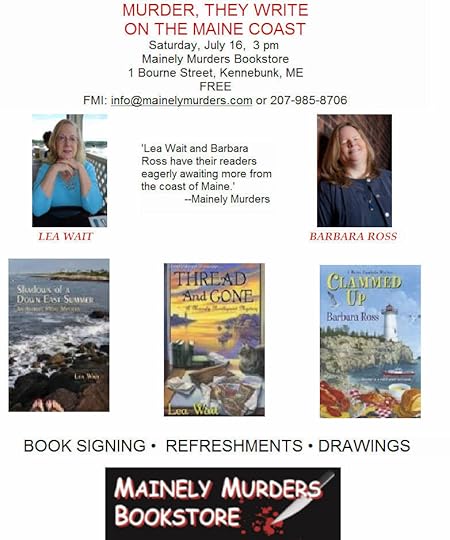Lea Wait's Blog, page 255
July 18, 2016
A (Choose Your Own Adventure) Day in Portland, Maine

Portland’s Old Port
I first laid eyes on Portland nearly twenty years ago, and I’ve lived here for fifteen. It’s a marvelous place to call home—small enough that its rhythms quickly become familiar, but vibrant enough that I still don’t feel as if I’ve experienced all it has to offer. The greatest difficulty in sticking to this month’s A Day In… theme was narrowing my post down to only one day’s worth of activities, so I didn’t. (I did, however, restrict myself to staying within the city limits, even though that meant no lobster rolls at Fort Williams Park—one of my go-to options whenever entertaining out-of-towners.)
Eat
It’s no secret that Portland is something of a foodie destination. (Sidebar: can we retire the word “foodie”? It sounds ridiculous.) Just ask the Boston Globe. Or the New York Times. Or Travel + Leisure. Or Food & Wine. Hell, I once stopped into the Holy Donut and saw two separate TV crews shooting spots on either side of their tiny Old Port shop.
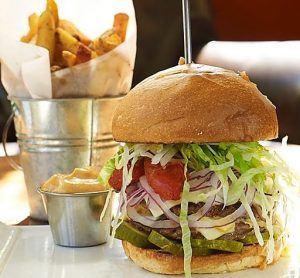
Mmm, Nosh
I could write ten posts about my favorite places in Portland to eat, but I’ll do my best to exercise (a little) restraint. If you’re passing through, you could do worse than starting your day at the aforementioned Holy Donut, or Dutch’s, or Standard Baking. Feel like pizza? Slab or Otto is sure to please. A little peckish in the afternoon? Try Ten Ten Pié. Looking for a damn fine burger? Head to Nosh or Woodford F&B. If you like barbecue, the folks behind Terlingua sure know their way around a smoker. And if you wanna have a meal so tasty it’ll change your life, hit up Central Provisions or Miyake for dinner. Afterward, be sure to swing by Hunt & Alpine for a nightcap.
Of course, that’s just one man’s opinion, and it barely scratches the surface. If you want to dig deeper into the Portland food scene, Portland Food Map is an indispensable resource. I can’t recommend the site highly enough. I’ll probably weep when Anestes tires of running it.
Drink
I’m not gonna lie to you. This is where the one-day thing gets dicey. If you wanna check out Portland’s booze scene, don’t be a hero. Prioritize. Designate a driver or take the Brew Bus. And for god’s sake, hydrate.

A free flight courtesy of Allagash
For my money, the best place to start is Industrial Way, off Riverside, where the venerable and munificent Allagash offers free flights and a spectacular tour (the latter is also free, but requires you to sign up online). Across the road from Allagash, Foundation and Austin Street are quietly brewing up some of the tastiest beer on the planet. Alas, Bissell Brothers used to be there too, but they recently moved to a snazzy new brewery on Thompson’s Point that’s more than worth the trip if you, like me, love hops… and Cellar Door Winery is right next door.
East Bayside offers you some good bang for your booze buck, with loads of options within walking distance. Rising Tide and Bunker are my favorites of the breweries. Urban Farm Fermentory makes tasty cider and kombucha. Maine Craft Distilling pours free samples of its spirits, including a shockingly good malt whiskey and a blueberry moonshine for those who like their hooch a little sweeter. And just up the hill on Washington, Oxbow and Maine Mead Works are worth a stop.
See/Hear/Do
Seems to me, you’ve gotta walk off all that food and booze. To that end, here are a few suggestions.
Like museums? Whether your taste runs from fine art to cryptozoology, Portland’s got you covered. Plays? Check out Portland Stage (I’m writing this post on Saturday, and I’ve got tickets to see Heathers there tonight). We’ve got no shortage of good music coming through (I’m particularly psyched to see Julien Baker next week). And I’ve already written at length about my love for Portland Architectural Salvage.

Jewell Falls
Maybe you’d prefer something a little more outdoorsy? You could wander the Old Port (where I put Lester’s fictitious bar) or the Back Cove. Explore the islands of Casco Bay by ferry—or better yet, by kayak. You may know Portland is crisscrossed by countless nature trails, but did you know it also has its own waterfall? Until recently, I didn’t.
Portland’s got loads to offer book nerds, too. A spectacular public library. Three great indie bookstores—Letterpress, Longfellow, and Sherman’s—with another on the way. (If you stop into any of them, might I recommend you pick up a copy of THE KILLING KIND? Most hardcovers in town are already signed. The paperback comes out 8/2.) And I almost hesitate to mention it because it’s something of a secret, but one of my favorite hidden spots in town is the garden tucked behind Henry Wadsworth Longfellow’s house on Congress Street.
Stay

Yes, those are typewriters
Portland’s got loads of nice hotels, but since I make my living peddling words, I wanted to highlight one in particular: The Press Hotel. Once the headquarters of the Portland Press Herald, it’s since been reborn as every writer’s ideal home away from home.
Of course, you could just move here to save yourself the trouble of finding a hotel. Lord knows it’s one of the best decisions I’ve ever made.
***
Chris Holm is the author of the Collector trilogy, which blends crime and fantasy, and the Michael Hendricks thrillers. His first Hendricks novel, THE KILLING KIND, was nominated for an Anthony, a Barry, a Lefty, and a Macavity Award and named a New York Times Editors’ Choice, a Boston Globe Best Book of 2015, and Strand Magazine’s #1 Book of 2015. Hendricks returns September 13th in RED RIGHT HAND.
July 17, 2016
Where I Get My Ideas
Dorothy Cannell: I recently told my husband Julian that I was turning into Miss Marple.
Marple.
“An urge to sit knitting something white?” he asked.
“No. My wild knitting days are long behind me. I’m talking about seeing wickedness at every turn.”
He looked nervous. “What have I done? Left my socks on the floor?”
“Nothing to do with you. It’s that TV commercial, the one about being alert to the warning signs of Alzheimer’s. One of which is leaving objects in peculiar places.”
“I haven’t seen it.”
“You wouldn’t have.” Julian has an uncanny ability to nap through commercials and snap awake the second the program we are watching resumes. “It goes like this,” I said. “A man looking to be in his sixties to seventies is seated on a sofa reading a newspaper. A female voice is heard in the background exclaiming quaveringly, ‘I don’t understand it.’ Man on sofa: ‘Have you lost your keys again?’ Emphasis on the again. That was enough to make me dislike him.”
Julian: “He’s an actor in a commercial.”
“If he were a character in a book I could dislike him the moment he opened his mouth.”
“What next in this tension packed mini-drama?”
 “He lowers the newspaper reluctantly and says, ‘I’ll help you look.’ But does he do so? No! He pours himself a cup of coffee. Opens the refrigeration picks up a carton, we’ll assume from the size it’s half and half, and low and behold there are the keys. He’s staring at them, shaking his head when the woman comes into the room looking utterly bewildered. Their eyes meet, hers glazed with fear. ‘It’s alright baby,’ he says’ his tone making clear that it’s anything but.
“He lowers the newspaper reluctantly and says, ‘I’ll help you look.’ But does he do so? No! He pours himself a cup of coffee. Opens the refrigeration picks up a carton, we’ll assume from the size it’s half and half, and low and behold there are the keys. He’s staring at them, shaking his head when the woman comes into the room looking utterly bewildered. Their eyes meet, hers glazed with fear. ‘It’s alright baby,’ he says’ his tone making clear that it’s anything but.
“Not so very odd if you think about it. Picture yourself coming into the house with the keys in one hand and the carton of half and half you’d just driven to the store for when something jolts your attention somewhere else. The phone rings, a picture falls off the wall and lands with an almighty crash, you hear the cat scream from outside letting you know it’s in a fight with that nasty feline from next door. The keys drop from you hand onto the refrigerator shelf. Now if the husband had found them in the flour canister or hung on the Christmas tree that would be worrisome.”
“So where’s wickedness? Julian asked. “Pharmaceutical companies running commercials that unnecessarily panic older people?”
“I’d prefer they took a more circumspect approach, but no, the evil emanates from the husband. The first time I watched I took him for an insensitive clod. On further reflection it came to me that the Gaslight syndrome was afoot here. He put the keys behind the carton. He had for some time been misplacing them and other objects.
“He’s been wanting her dead since he fell madly in love with his Swedish massage therapist thirty years his junior. Oh, you can well believe he’s been spreading the word that his wife’s mental capacities are rapidly declining, and those spending time in her frazzled presence will see the signs. When she‘s found drowned in a local lake it will be taken for granted she wandered away from home during the night.”
“It’s a commercial, Dorothy.”
“I know that. And thanks for never having called me ‘baby’ His use that term when 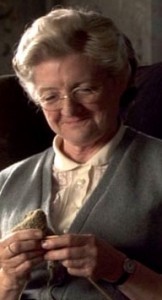 speaking to her underlined his determination to crush any self-esteemed he’d left her with.”
speaking to her underlined his determination to crush any self-esteemed he’d left her with.”
“I’m all for husbands,” said Julian, “but I hope he doesn’t get away with it. Being married to a writer takes its toll.”
“I won’t let him, because I’m going to write the rest, but not until I’ve reread a Miss Marple. Such an inspiration at age 130 as she must have been towards the end of her appearances. She was still a whiz at ferreting out evil. A life fully lived, focused on the now, not what may or may not happen down the road. Isn’t what we should all hope for?”
Dorothy
July 16, 2016
A Day in Belgrade Lakes
When the Maine Crime Writers were asked to write posts for our summer series “A Day In…” my choice was obvious.
E.B. White, 75 year ago, wrote an essay about Belgrade Lakes, “Once More to the Lake.” He’d taken his son there, to the same place he himself spent summers as a child.

Summertime, oh summertime. It’s everywhere in Belgrade Lakes.
The essay was about a lot of things: life, mortality, days lost and found. But it was also about Belgrade Lakes and how it made him feel. At one point in the essay he just lets loose:
Summertime, oh summertime, pattern of life indelible, the fade-proof lake, the woods unshatterable, the pasture with the sweetfern and the juniper forever and ever, summer without end.

The fade-proof lake
The great thing about Belgrade Lakes, a little village about 15 miles north of Augusta squeezed onto an isthmus between Great and Long ponds, is that much of what White wrote about in that essay still rings true. The smells, the lakes, the camps. Boating to the store, which is still there and much like it was when he wrote about it.

Main Street, Belgrade Lakes
I’m lucky enough to live here. But it’s easy to spend a day in Belgrade Lakes. Easy in more ways than one. This central Maine village, a small but important part of the spread-out town of Belgrade, is true vacation land. If you’re looking for fancy restaurants and shops, snappy downtowns, lobsters or lighthouses, you can find them somewhere else in Maine. Belgrade Lakes is quintessential relaxed summertime slowdown central. It’s a throw-back town that summer residents on the lakes still boat to, where the town’s seasonal eateries roll the dice on nice weather for a few months and seating is outside at picnic tables, and most of the things to do don’t involve spending money.
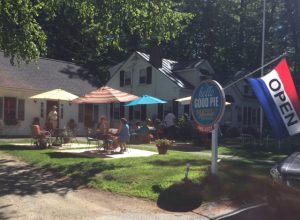
Hello, Good Pie. The bakery and coffee shop is a popular morning stop in Belgrade Lakes.
No morning in The Lakes would be complete without a coffee and excellent pastry of breakfast sandwich from Hello, Good Pie. The bakery and coffee shop at the south end of town on Route 27 (Main Street), has been a must-stop for locals and tourists alike since it opened last year. It’s just one of many small, local eateries in town. No one goes hungry in Belgrade Lakes.
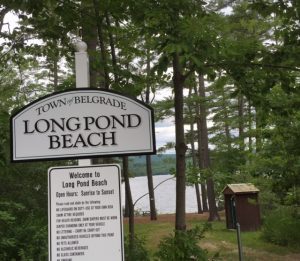
Belgrade Lakes’ town beach is just the thing on a relaxed summer day.
After breakfast, the best way to relax on a nice summer day is to head to the town beach on Long Pond, a minute or two walk from downtown. This isn’t some sandy, suntan-oil smeared, people-backed beach. It’s a grassy spot in the woods, with granite steps — a vestige from the old Lakeshore Hotel that burned down in the 1950s — leading into the too-clear-to-believe water of Long Pond. Sometimes it’s crowded, but not often.
If boating is more your thing, there’s a public boat landing on Great Pond, and you can put a canoe or kayak anywhere on the three bodies of water that define the mile-long village: Great and Long pond, and Mill Stream, which connects them.
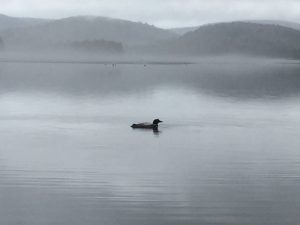
Long Pond loon
Great Pond, which the play and later the movie, “On Golden Pond” was the inspiration for, bounds the east side of the village. Long Pond, which stretches along the west side, may not have inspired a movie, but its crystal-clear water, mind-blowing sunsets and ever-present loons have inspired a love of Maine that keep people coming back year after year.
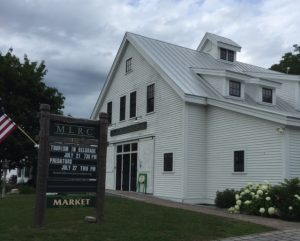
The Maine Lakes Resource Center is a great place to stop in on a hot, or rainy, day.
A relaxing stroll down Main Street is also in order. No fancy shops here, but several small gift shops and the excellent Maine Lakes Resource Center, which is a great place to spend some time on a rainy day or to get out of the heat. Not only does it have lots of exhibits and information about the lakes, but also about the history of the area. It also frequently hosts talks and events, all of it free.

Spiro’s Gyros, one of the excellent seasonal outdoor-eating choices in Belgrade Lakes.
Hungry already? The lunchtimes options abound. The best gyro you’ll find anywhere is at Spiro’s Gyros on Main Street. Right across the street is Pete’s Pig, some of the best pulled pork you’ll find anywhere. Want more? Down the street is 182 Main, with wood-fired pizza. All are seasonable businesses with outside seating. Nothing fancy in the Lakes, because we’re on vacation, right?

View of Long Pond from the hike up The Mountain in Rome, Maine.
Want more of a walk than the three of four blocks of Main Street? The Kennebec Highlands offers trails throughout the region. One withing walking distance north on Route 27 in Rome, The Mountain, is a great hike for all ages and the payoff is views of both Long and Great ponds at the top. There are dozens of hikes within a short drive of the village, and if you want something more strenuous, drive north on Route 27 and within 45 minutes you’ll be entering the High Peaks region of Franklin County. Just get back in time for dinner!

The public docks on Mill Stream are a great place to relax.
But you don’t have to keep moving around. It’s vacation, after all. There are a lot of places in the village to just sit and watch — whether it’s people or the water. Mill Stream, which connects Great Pond and Long Pond, is a happy thoroughfare in the summer, but also a home to ducks, loons, sweet breezes and daydreaming. Take a seat along the public docks behind the post office and the lakes resource center annex, and across the street from Day’s Store. You won’t want to get back up.
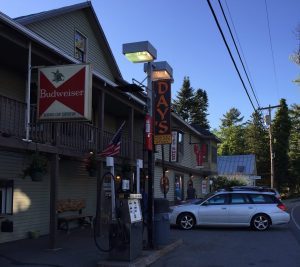
Day’s Store, a hub for both locals and tourists.
No trip to the village is complete without a stop at Day’s Store. The same store E.B. White wrote about in “Once More to the Lake” caters to area residents year-round and also is a must for summer people and those passing through. It’s got groceries, pizza and subs, coffee, booze, bait, outdoor equipment, the best home-made doughnuts in Maine and even some books by one of the town’s resident mystery writers (that’s me!).
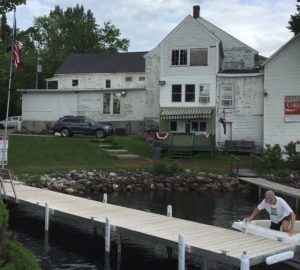
Staying on one of the lakes, tie up the boat behind Day’s (or the post office or Maine Lakes Resource Center) and have some ice cream, do your shopping or stroll around town.
You can eat your sub or drink your coffee out behind Day’s, and also get an ice cream fix at the ice cream window that overlooks Long Pond. Those who have camps on the Lakes boat to Day’s, tying up at the dock behind the store, or from Great Pond, the docks on Mill Stream at the Maine Lakes Resource Center and its annex next to the post office and across the street from days. Just like E.B. White used to do!
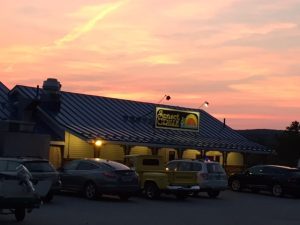
The Sunset Grille, which frequently lives up to its name, is where we wind down at night in Belgrade Lakes.
After all that swimming, walking around and hiking, a great way to wind down at night is at the Sunset Grille. Trivia night and live music not only keep the locals busy year-round (it’s the only restaurant open in town during the winter), but it’s about what you’re going to get for live entertainment.
Don’t want to leave? Stay overnight at The Village Inn, which also has live entertainment many nights on its tavern on Mill Stream. Or rent a camp on one of the many lakes. Once the sun goes down, the only sound you’ll hear are the cries of loons and the breeze in the trees.
When the crime writers first talked about writing this series, there were some jokes, as there always are in Maine, about wanting to keep our special places secret at keep the crowds away. But I’m not telling you anything E.B. White didn’t already say 75 years ago (and better). So come on up for a day or longer. It’s worth it.
COMING UP: If Belgrade Lakes still has too much hustle and bustle for you, check back on July 27, when I’m posting “A Day in Baxter State Park.”
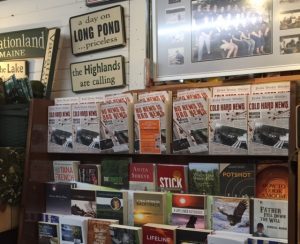
The interior of Day’s Store includes…wait, what’s that? …books by the town’s resident mystery writer!
Maureen Milliken, a Belgrade Lakes resident, is the author of the Bernie O’Dea mystery series (available at Day’s Store among other places!), the second of which, No News is Bad News, was released earlier this month. Follow her on Twitter at @mmilliken47, on Facebook at Maureen Milliken mysteries, and check out what’s going on with her books or sign up for email updates at maureenmilliken.com.
BOOK SIGNING: Maureen will be signing No News is Bad News and Cold Hard News from 10 a.m. to noon, Saturday, July 23, at The Children’s Book Cellar, 52 Main St., Waterville.
July 15, 2016
Weekend Update: July 16-17, 2016
 Next week at Maine Crime Writers there will be posts by Dorothy Cannell (Monday), Chris Holm (Tuesday), Kathy Lynn Emereson/Kaitlyn Dunnett (Wednesday), Lea Wait (Thursday), and Dick Cass (Friday). And in our special “A Day In . . . “ series, Maureen Milliken will post a blog tomorrow and Vaughn Hardacker will chime in on July 24th.
Next week at Maine Crime Writers there will be posts by Dorothy Cannell (Monday), Chris Holm (Tuesday), Kathy Lynn Emereson/Kaitlyn Dunnett (Wednesday), Lea Wait (Thursday), and Dick Cass (Friday). And in our special “A Day In . . . “ series, Maureen Milliken will post a blog tomorrow and Vaughn Hardacker will chime in on July 24th.
In the news department, here’s what’s happening with some of us who blog regularly at Maine Crime Writers:
from Kaitlyn Dunnett/Kathy Lynn Emerson/Kate Emerson:
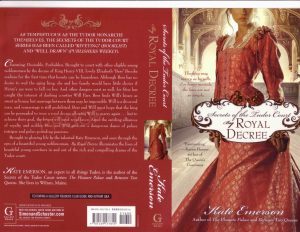 As many of you know, a few years back I wrote six non-mystery historical novels using the pseudonym Kate Emerson. Although they are all set at the court of Henry VIII, they are not a series. Each is a stand alone featuring a real Tudor woman as the central character. The Kindle editions of four of the six are now selling for below $5 (a BIG improvement, believe me!) and one of them, By Royal Decree, is also now available in MP3-CD format. They’re all available as Audible downloads. Check out the details by going to Amazon and typing in “Kate Emerson.” If you just want more information, you can read about all the books at http://www.kateemersonhistoricals.com Enjoy!
As many of you know, a few years back I wrote six non-mystery historical novels using the pseudonym Kate Emerson. Although they are all set at the court of Henry VIII, they are not a series. Each is a stand alone featuring a real Tudor woman as the central character. The Kindle editions of four of the six are now selling for below $5 (a BIG improvement, believe me!) and one of them, By Royal Decree, is also now available in MP3-CD format. They’re all available as Audible downloads. Check out the details by going to Amazon and typing in “Kate Emerson.” If you just want more information, you can read about all the books at http://www.kateemersonhistoricals.com Enjoy!
On Thursday, July 21st, Kate Flora and Roger Guay will be at the Gray Library at 6:30 to talk about their book, A Good Man with a Dog.
On Saturday, July 16, (today if you’re reading this post when it is first published) Lea Wait and Barbara Ross will be at Mainely Murders Bookstore in Kennebunk, Maine at 3:00 pm. Love to see you there!
ON Saturday, July 23, Maureen Milliken will be reading and signing her new release, No News is Bad News, at 10 a.m. to noon at The Children’s Book Cellar, 52 Main St., Waterville. (It has more than just children’s books, obviously!). The first in her Bernie O’Dea series, Cold Hard News, will also be available.
An invitation to readers of this blog: Do you have news relating to Maine, Crime, or Writing? We’d love to hear from you. Just comment below to share.
And a reminder: If your library, school, or organization is looking for a speaker, we are often available to talk about the writing process, research, where we get our ideas, and other mysteries of the business. Contact Kate Flora: mailto: kateflora@gmail.com
Save
Save
July 14, 2016
Whodunit (and Whowonit) at Books in Boothbay 2016
Jen Blood here, coming to you in the midst of a very hectic moving day in Mid-Coast Maine. In my last post, I talked about the Murder Mystery Mashup at this year’s Books in Boothbay, which I helped Sisters in Crime New England stage at Boothbay Railway Village this past Saturday, July 9. It seems only fitting, then, to give you the solution to that mystery (and a little rundown on how things went) in this month’s post.
The mystery itself — in which mystery author Eunice K. Stoneheart finds herself at the wrong end of a copy of Kate Flora’s Agatha-nominated Death Dealer and meets her untimely end — went off without a hitch, and really was such a pleasure to pull together. Here’s a copy of the flyer I put together for the event, which every attendee who wished to try and solve the mystery received.
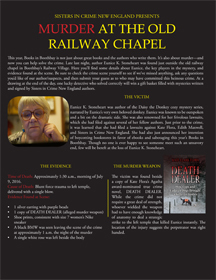
On the other side, there were blurbs providing the motive and opportunity of all seven suspects in the crime: Jeannette de Beauvoir, Kate Flora, Stephanie Gayle, Edith Maxwell, Maureen Milliken, Dale T. Phillips, and yours truly. From there, attendees could go to next door to the Railway Village town hall, where the authors were signing books, and ask the suspects questions like whether or not they were right or left handed, what kind of car they drove, etc. There were some VERY industrious amateur sleuths, particularly the younger folks, and it was great fun watching them interact with the authors and get to know one another while competing to solve the crime.
Boothbay Railway Village was phenomenal in its willingness to work with us in staging the crime scene, even allowing me to put painter’s tape on the old wood floors to serve as a chalk outline for Eunice’s body!
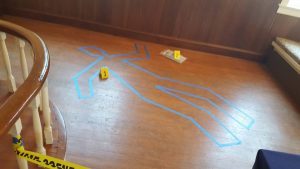
In addition to the body, there were evidence markers, evidence bags with things like the murder weapon, a stray earring found at the crime scene, a white rose beside the body, and more, for attendees to check out inside the chapel.
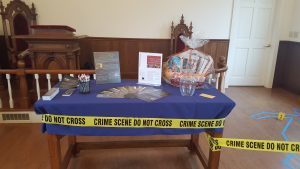
With all that said, now we get down to the nitty gritty. Who actually murdered Eunice K. Stoneheart?
Well… It turned out that the duplicitous Jeannette de Beauvoir, in line to receive a fortune as sole beneficiary in Stoneheart’s considerable life insurance policy, hired the wily Stephanie Gayle to murder poor Ms. Stoneheart. Gayle went to the Railway Village to do the deed, but Stoneheart heard Gayle enter the railway chapel… The two exchanged pleasantries, particularly surrounding the single white rose Gayle had brought with her — meant as a calling card to be left with the body. After the meeting, however, Gayle found she could not commit the crime, and she left the rose with a very-much-alive Stoneheart at approximately one a.m., at which point she drove her black BMW from the scene and returned to her hotel room.
MEANWHILE, the insidious Edith Maxwell had been working herself into a lather all evening after learning that Stoneheart was intent on suing Sisters in Crime New England because the chapter would not allow her donkey — the narrator of her cozy mystery series — to become an honorary member of the organization. Maxwell had already been named in other lawsuits filed by the hideous woman. What nerve! What a wretched waste of space! At last, after already leaving once at eleven p.m. to confront Stoneheart only to return at midnight a failure, Edith finally worked up the ire and the gall.
At just past 1 a.m., shortly after Stephanie Gayle left the premises, Edith returned to confront her nemesis. Stoneheart, utterly unrepentant, announced that she had no intention of rescinding her lawsuit against Sisters in Crime New England or anyone else, for that matter, and further called Edith some very uncharitable names. Edith, pushed to the brink, reacted by wrenching the book Stoneheart was reading at the time — Kate Flora‘s wonderful but weighty novel, Death Dealer — from Stoneheart’s hand, and delivering a single, calculated blow that killed the author instantly.
And that, my friends, is the story of Eunice K. Stoneheart’s unfortunate demise. The inimitable Dale T. Phillips continues to maintain that he never had any interaction whatsoever with Ms. Stoneheart, calling the woman delusional and assuring the public at large that the alleged romance between he and Stoneheart was complete fantasy on Stoneheart’s part. I’ll let you decide on that… Phillips really doesn’t seem that trustworthy to me. Maureen Milliken was at home with her dogs all night just as she had stated all along, though the author has not had any particularly charitable things to say about Stoneheart’s untimely death, and Kate Flora — despite those shifty eyes, and being the one who received the overwhelming majority of the votes from our amateur detectives — was indeed entertaining guests far from the crime scene for the entire evening.
As for the winners of the contest… Ellie Pendleton of Rockport, Maine, correctly solved the crime and was selected in the raffle to receive the $50 gift certificate from Sherman’s Books & Stationery. Elaine Athans of Boothbay Harbor likewise solved correctly, and won a huge gift basket of signed mysteries by Sisters in Crime New England authors.
And that brings to a close the mystery of Eunice K. Stoneheart. Books in Boothbay has already expressed interest in doing another murder mystery next summer, however, and I’m already hard at work thinking up scenarios and new ways to stump the investigators who come from near and far to enjoy the day. If you haven’t made the trek before, I hope you’ll be able to join us next summer for another murder at the Railway Village!
Jen Blood is author of the Erin Solomon mysteries, and the recently released 5-Day Fiction Guide to Creating Complex Characters. You can learn more about her and get your free copy of her book of short stories, In Between Days, at www.jenblood.com.
July 13, 2016
A Canoeing or Kayaking Holiday
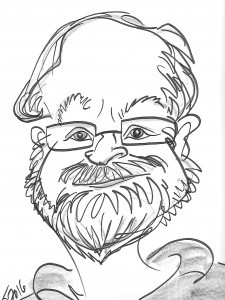
Vaughn
In keeping with our summer Day In blogs I’d like to introduce you to a place where you can spend a day, a week, or even a couple of months. Up here in THE COUNTY we call them the lakes, but their official name is the Fish River Chain of Lakes. Click the link to see Google Earth’s sat photo of the lakes.
The chain consists of eight lakes all connected to one another via a number of thoroughfares as well as Fish River itself. The lakes are (from east to west) Long Lake, Mud Lake, Cross Lake, Square Lake, Eagle Lake, Saint Froid Lake, Portage Lake, and Fish Lake (the most remote of them only accessible by unpaved tote roads). What is unique about these lakes is that you can put a canoe or kayak in at the public boat launch and access all of the lakes. Most of them can be accessed by a motorboat however when the water recedes during late June, July, and August the Square Lake outlet of the thoroughfare between it and Cross Lake will be as shallow as two feet. Many of the shorelines are lined with homes (a number of people live year-round on Long, Cross, Eagle, St. Froid, and Portage Lakes) that may or may not reside on land they own (in by-gone years one could not purchase the land but could get a ninety-nine year lease) much of the land is now controlled by Irving Corporation and to cut a tree without their
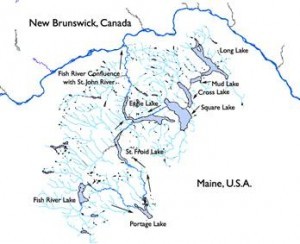
Fish River Lakes
permission will get the camp or home-owner into a conflict. Whether owned land or leased the lakes are a beautiful place to live with year-round benefits. In summer you can swim, boat, jet-ski, or fish; fall will dazzle you with nature’s art as the foliage surrounding the lakes bursts alive with color (actually, the color we see is the natural color of the leaf, the green is the result of chlorophyll–but that’s a subject for another blog) and if you are a hunter there are hundreds of square miles of forest in your back yard I find this the perfect time for a long ATV trip–many of the railroad track beds have been converted into trails; in winter there is ice-fishing and snowmobiling. The lakes are ideal habitat for a great number and species of game fish (many of which will be mentioned).
Each of the lakes has areas where campers have created impromptu campsites (a night in one of these will give you an idea of what life was for our ancestors as they traveled across our great country.
Due to the fact that this might turn into a long dissertation we’ll only travel a single day, from Sinclair, ME on Long Lake to the camping area at Limestone Point on Square Lake. That being said, lets start our trek.
Long Lake
Long Lake extends southward from Saint Agatha into Maine township 17 ranges 3 and 4. Tributaries Brishlotte Brook, Ouellette Brook, and Little River flow into the north end of the lake. Paulette Brook flows into the east side of the lake; Mud Brook flows into the southeast end of the lake; and McLean Brook, Bard Brook, and Pelletier Brook flow into the southwest arm of the lake.[2] The lake overflows from the end of the southwest arm through the Long Lake Thoroughfare into Mud Lake approximately 500 meters (550 yd) away. There are two boat launch areas, a picnic area, and numerous residences and camps where Maine State Route 162 follows the west shore of the lake. Long Lake is the deepest lake of the chain (163 feet), and provides good habitat for brook trout, rainbow smelt, and land-locked salmon. In winter there are areas so full of ice-fishing shacks it reminds one of a depression-era shanty town.
Mud Lake
Long Lake Thoroughfare discharges into the east end of Mud Lake in Maine township 17, range 4; and the west end of Mud Lake in township 17, range 5, discharges through Cross Lake Thoroughfare into Cross Lake approximately 1.5 miles (2.4 km) away.[2] Numerous residences and camps line the north shore of Mud Lake along Maine State Route 162. Mud Lake is the smallest and shallowest (22 feet) lake of the chain, and provides habitat for longnose sucker, hornpout, and yellow perch.
Cross Lake
Mud Lake discharges into the east side of Cross Lake in Maine township 17, range 5; and the south end of Cross Lake in township 16, range 5, overflows through Square Lake Thoroughfare into Square Lake approximately 1 kilometer (1,100 yd) away. There are residences and camps along the north end and eastern shore of Cross Lake where Maine State Route 161 follows the northeast shore of the lake; and there is a public boat launch and picnic area on the southeast shore. The remaining shoreline of this shallow lake (46 feet) is boggy and undeveloped.[2] Tributaries Dickey Brook and Daigle Brook enter the north end of the lake and Black Brook enter the south end providing spawning and nursery habitat for brook trout, rainbow smelt, and land-locked salmon.

Cross Lake looking north toward Fort Kent

Cross Lake- Square Lake thoroughfare
Square Lake
Cross Lake discharges into the east side of Square Lake, and the north end of Square Lake overflows 3.5 miles (5.6 km) through Eagle Lake Thoroughfare into the eastern arm of Eagle Lake. Square Lake is the largest lake of the chain (8090 acres) and is almost entirely within Maine township 16, range 5. Tributaries Dimock Brook and California Brook flowing into the north end of the lake from township 17, range 5, and Goddard Brook flowing into the south end from township 15, range 5, provide good spawning and nursery habitat for brook trout, rainbow smelt, and land-locked salmon.
Navigating the thoroughfare between Cross and Square Lakes is a challenge. Long ago boulders were deposited and in low water seasons it is best to have a Rock Watch assigned to stand in the bow of your boat to spot them (local rumor is that the boulders were put there to make the following link will take you to a YouTube video of traveling the thoroughfare with 89 year old Norman St. Peter (now well into his nineties).
Similar to Lake Superior, Square Lake has a reputation of being treacherous having claimed the lives of a number of fishermen (one of them a man I grew up and went to school with). I have personally experienced how rapidly the lake can go from a glass-like placid surface to choppy with waves high enough to swamp many boats. I have spoken with many local sportsmen who refuse to fish Square Lake.
From the thoroughfare it is a lengthy paddle northwest toward the Eagle Lake thoroughfare and the campsite at Limestone Point. The campsite has no amenities ladies so be prepared to live as pioneer women did. You will now be deep into the forest and due to the lack of ambient light, on a clear night you will be rewarded by a view of the Milky Way that is breath-taking.
In my next blog we’ll depart Square Lake for Eagle Lake and spend some time at the Eagle Lake Sporting Camps.
July 12, 2016
A DAY IN MID-COAST MAINE
Because Mid-Coast Maine embraces a lot of territory, I’ll stick to my corner of the coast, and let’s make the day this Friday, July 15. You’ll see why shortly. Even though we’re starting early, there’s way too much we’ll have to miss. After a delicious breakfast in Rockland at the Home Kitchen Café or at your charming B&B, you’re out for the day.
The town is home to many art galleries, the newest the Center for Maine Contemporary Art, on Winter Street. The CMCA’s amazing building is itself a work of art.
Exhibitions change but all feature works by artists with ties to the state of Maine. Current featured artists include Alex Katz and Jonathan Borofsky.
Just across Main Street, visit the world-class Farnsworth Museum, with a range of exhibits in more than one building. Some of my favorite paintings are by the famous Wyeth family—N.C., Jamie, and Andrew. One of the more distant exhibits is in Cushing, the house that served as backdrop for Andrew Wyeth’s famous painting Christina’s World.
Enjoy a delicious lunch at one of the many local restaurants. I can’t choose for you, but you can’t go wrong with lobster. Then walk off your meal along the Rockland Breakwater. Out of Rockland north on Main Street, turn right onto Waldo Avenue. A half mile along, go right onto the Samoset Road, which ends in the small parking area for the Breakwater. The Breakwater, to the left of the parking area, leads about .8 miles to the lighthouse.
The mile long granite jetty, originally built between 1880 and 1900, offers a stunning panoramic view of Penobscot Bay and a glimpse of Owls Head Light. The granite blocks are uneven and could be wet, so wear good walking shoes and don’t forget your camera!
If you time it right, you can see the Maine Windjammer Parade of Sail. On that day, more than a dozen nineteenth-century-style tall ships pass by from 2:00 to 4:00 p.m. A photographic opportunity not to be missed. If you miss the parade, you might still catch sight of a few of the windjammers as they cruise by with afternoon sightseers or with folks out for the week’s tour. I took this picture one year from our small sailboat.
After your mile walk back to land, if you’re still in the mood for gorgeous views and lighthouses, head south on Route 1. In Thomaston, turn left onto Route 131. At that corner is another fascinating museum—Montpelier, the Knox Museum. The mansion is a reproduction of the retirement home of Revolutionary War hero General Henry Knox and contains many original furnishings. Docents in period costumes share history and glimpses of life in that time. But that tour will have to wait for another day. We’re running out of time this Friday.
The drive down the St. George peninsula affords views of farm fields sweeping down to the St. George River and farther down, picturesque coves dotted with small islands and lobster boats. Entering the fishing village of Port Clyde, take a left and follow signs to the Marshall Point Lighthouse. There you reach the end of the peninsula and the southern end of Penobscot Bay.
Along with the light (1858), at the end of a long wooden runway, are gardens and paths.
The lighthouse may look familiar because of being featured in the film Forrest Gump as the eastern end of Tom Hank’s character’s cross-country run. The restored Keeper’s House (1895) contains a museum housing exhibits centered on the lighthouse and peninsula life. The paths and runway to the light offer views of the ocean, waves breaking on the rocky shore, and the village harbor.
If you’re worn out from your full day, be sure to have an ice cream in Port Clyde or a snack at the General Store, where you can look out toward Marshall Point. If you have Saturday still to tour the Mid-Coast, check out boat tours, some aboard lobster boats. For more about the Wyeths, board the Linderin Losh in Port Clyde. The tour includes itineraries focused on locations, the lives, and work of the Wyeths and a lobster trap-hauling demonstration.
On this Saturday and Sunday, you can rock out to the blues at the North Atlantic Blues Festival in Rockland Harbor Park. This is a picture I took a few years ago.
A longer visit could include ferry rides to the offshore and bay islands. As you can see, Mid-Coast Maine encompasses more than I’ve covered, so I’ve had to omit many landmarks and sights in the area.
Maybe commenters can suggest others.
July 11, 2016
Have Books, Will Travel . . .
Kate Flora: It’s summer in Maine. For many, it is the season of vacation, of ponds and lakes and oceans, of farmer’s markets, of tending vegetable gardens or picking berries. For writers, it is the season of libraries, book fairs, street fairs, and book stores, and a chance to meet readers and talk about the stories we tell and the process we use to tell them.
During the summer, I put a lot of miles on my car. Sometimes it can be exhausting, especially those long drives back to Bailey Island late at night when it seems that every road is under construction. But traveling to different parts of the state is a treat, too. I love all the different “Maines” that I get to see and appreciate the work that people put into organizing author events. A few summers ago, I vowed that eventually I would visit every library in Maine. I am slowly knocking them off my list, but Maine has so many libraries it’s going to take a while.
Here are some of the library and bookstore adventures from last summer, and early this year:
A wonderful mystery author “Death and Desserts” with sister writers Dorothy Cannell and Lea Wait at the Liberty, Maine library. If you aren’t familiar with “Death and Desserts,” it’s an event that features both crime writers and criminally amusing desserts. For this one, the library had gone all out to create a devilishly funny feast, and capped the event by drawing a chalk outline of Dorothy’s handsome grandson on the asphalt outside the library door. Not only is this a great library, but across the street, for tee shirt fans, is Liberty Graphics, where you can get Blueberries for Sal and One Morning in Maine onesies for little readers. http://lgtees.com

Death and Desserts at the Liberty Library with Lea Wait and Dorothy Cannell
A trip to the Rangeley Library, a beautiful arts and crafts library with a gorgeous and beautifully tended library garden. If the pleasure of seeing that part of the state wasn’t enough, the library also arranged for us to stay at Highland Heath House http://www.highlandheathhouse.com a spectacular Bed & Breakfast overlooking Rangeley Lake, with gorgeous rooms, a marvelous view, and a gourmet breakfast. This was an amazing treat, since writers, while always assumed to be rich, are lucky if we make enough to pay for gas and bookmarks.

The view from the Highland Heath House

Rangeley Library garden

A day at the Beyond the Sea Book Festival in Lincolnville, http://www.beyondtheseamaine.com where the bookstore owner, Nanette Gionfriddo both made us very welcome and provided a much appreciated chance for authors who generally live solitary lives at our writing desks to spend time together. We also got to enjoy view of Lincolnville Beach and meet readers from all over the country. This year, the event will be on Saturday, July 30th.
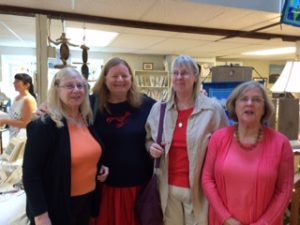
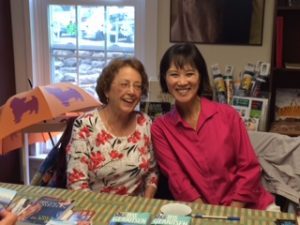
Susan Vaughan and Tess Gerritsen
In September, courtesy of the Jesup Memorial Library in Bar Harbor, there was Murder by the Book, a Friday night and all day Saturday event with workshops and panels. The Jesup really knows how to throw a party. We writers got treated like royalty—with a wonderful Friday dinner and an overnight stay at The Bluenose Inn, http://barharborhotel.com a place with rooms so gorgeous I wanted to move there and never leave.
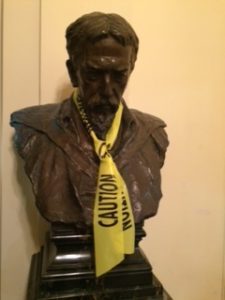
Crime scene tape makes an excellent necktie
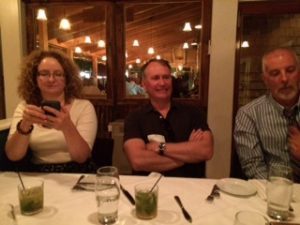
Melinda Rice, Paul Doiron, and Bruce Coffin in Bar Harbor
And of course this past weekend, it was Books in Boothbay, a yearly summer bookfair. The best place to meet other authors, and readers. The books, as always, were provided by Sherman’s, lunch by Boothbay Harbor merchants, and the clever and energetic Jen Blood created a crime scene and a whodunit detective game for everyone to play. I seem to have been the prime suspect, owing in part to my shoe size, but I swear it wasn’t me.
There are many more summer book events ahead, so keep your eye out for Maine Crime Writers. Check out our weekend update. We’re everywhere. And if you can’t find us? Well, maybe it’s time to organize an event and invite us.
Happy Reading in Maine.
p.s. Tonight (Tuesday, July 12th) Jen Blood, Lea Wait, and I will be at the Belfast Library at 6:30. We’d love to see you there.
A Week Down East
John Clark sharing highlights from our week on the ocean in Perry. This was our third time renting Seawall Cottage, part of a group that are collectively known as Cobscook Bay Cottages.(http://www.cobscookbaycottages.com/) We like it because it’s comfortable, secluded and almost on the beach. All of the cottages have gas lights, hot water, refrigerator and stove. There’s no electricity and It’s nice to be cut off from technology once in a while.

Nothing better than a child discovering something new
Instead of Facebook, we had starfish, sea urchins, seals, loons, eagles and rabbits on the lawn. We also saw several deer including a fawn that couldn’t have been more than a couple weeks old. Beth gloried in all the trails she could hike while I collected interesting rocks and read 11 books.
One reason we like this vacation spot is because it’s central to many things we like to revisit. This time, daughter Sara, son-in-law Russ and granddaughter Piper stayed with us from Saturday through Tuesday morning. We spent most of Sunday enjoying Lubec, starting with the library book sale (I always get good stuff at their sale), then helping Piper find sea glass and shells before heading to Frank’s Dockside Restaurant for lunch. Their deck overlooks the channel between Lubec and Campobello Island and we saw several seals while enjoying lunch.

Can you imagine Reed or Popham this deserted on a July day?
Eastport on the 4th of July was packed, so much so that they brought in a nice bus from the International Park on Campobello to shuttle people from the airport to the waterfront. There were several airplanes to admire while waiting for a ride. Piper got a kick out of a two person ultralight. Russ got a bigger kick out of the antique cars on display on Main Street while Piper and I went out on the pier to watch the greased pole competition and tried to spot a whale. After a quick browse through the books at the Peavey Library sale, we had ice cream while enjoying the bike and carriage parade before returning to our vehicles. We had a picnic at Shackford Head Park, mindful of the fire ants which have taken over much of the wooded area there. On the way back, we stopped at a beach just before entering Sipayik to look for beach glass. We found plenty, but few pieces worth keeping.

Beth with an entire cove to herself
The area near Seawall Cottage was perfect for viewing fireworks. In addition to a clear view of the Eastport display, we could see two private shows to our south as well as a very loud and vivid one at a nearby home across a small inlet. That one, however, failed to deter a very hungry cloud of mosquitoes.
After Sara, Russ and Piper left, Beth and I headed for Campobello. Our favorite beach for finding sea glass and pottery is there and we’ve never been disappointed. If anything, we find too much and then have to spend considerable time triaging after getting home. We also had lunch at the island golf course before walking on the very long beach at Herring Cove where we took lots of photos, trying to capture waves and interesting rocks. We made one last stop on the boardwalk trails opposite FDR’s home before stopping in Lubec for more ice cream.

I love the reflection here. This was in Moosehorn.
Wednesday was a hiking day. We walked numerous trails through the southern part of Moosehorn Wildlife Refuge. While we didn’t see a lot of wildlife, only an eagle, we got to enjoy a couple kinds of ripe berries as well as lament the sad fate of several dozen turtle eggs that had been dug up and devoured by predators.
Thursday was very rainy and a perfect day to hole up and read while sitting by a wood fire. Friday tried to be a down day, too, but we kayaked with a seal while finding really interesting rock shapes. I used driftwood to create a loose frame that I filled with odd rocks just to see how it would look. I’ll let you judge whether it’s art or foolishness. In the process, I found a half dozen rocks that resemble designer shoes as well as one that looks like a basilica with a cross on top and am planning on using them for some sort of display.

Art, you say?
It was fun to eat good food, sleep with waves in the background and not think about what was happening in the ‘real’ world. If you’ve never been to this part of Maine, I encourage you to do so. I’d live there if I could.
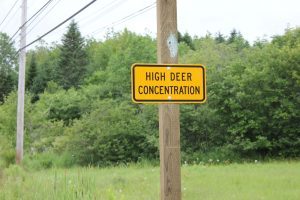
I wonder if it will get worse if the marijuana referendum passes.
July 8, 2016
Weekend Update: July 9-10, 2016
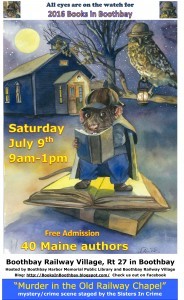
 Next week at Maine Crime Writers there will be posts by John Clark (Monday), Kate Flora (Tuesday), Susan Vaughan (Wednesday), Vaughn Hardacker (Thursday), and Jen Blood (Friday).
Next week at Maine Crime Writers there will be posts by John Clark (Monday), Kate Flora (Tuesday), Susan Vaughan (Wednesday), Vaughn Hardacker (Thursday), and Jen Blood (Friday).
In the news department, here’s what’s happening with some of us who blog regularly at Maine Crime Writers:
Saturday, July 9, from 9 a.m. until 1 p.m., Maine Crime Writers Jen Blood, Jessie Crockett, Kate Flora, Maureen Milliken, Barbara Ross, Lea Wait, and alum Paul Doiron will be among the thirty-five authors signing their books at Books in Boothbay, Route 27, at the Boothbay Railway Museum. Sisters in Crime of New England will also be presenting “Murder in the Old Railway Chapel,” testing your deductive skills.
July 11, at 6:30 p.m., Vaughn Hardacker will be speaking at the Freeport Community Library.
July 13, at 3:30 p.m., Vaughn Hardacker will be speaking at the Fort Fairfield Public Library.
July 12, from 6:30 until 8 p.m., Kate Flora, Jen Blood and Lea Wait will be speaking at the Belfast Library in Belfast, Maine about (fictional) crime in Maine.
July 16, at 3 p.m., Barbara Ross and Lea Wait will be talking about their and other Maine mysteries at Mainely Murders Bookstore, 1 Bourne Street, in Kennebunk, Maine.
An invitation to readers of this blog: Do you have news relating to Maine, Crime, or Writing? We’d love to hear from you. Just comment below to share.
And a reminder: If your library, school, or organization is looking for a speaker, we are often available to talk about the writing process, research, where we get our ideas, and other mysteries of the business. Contact Kate Flora: mailto: kateflora@gmail.com
Lea Wait's Blog
- Lea Wait's profile
- 509 followers


